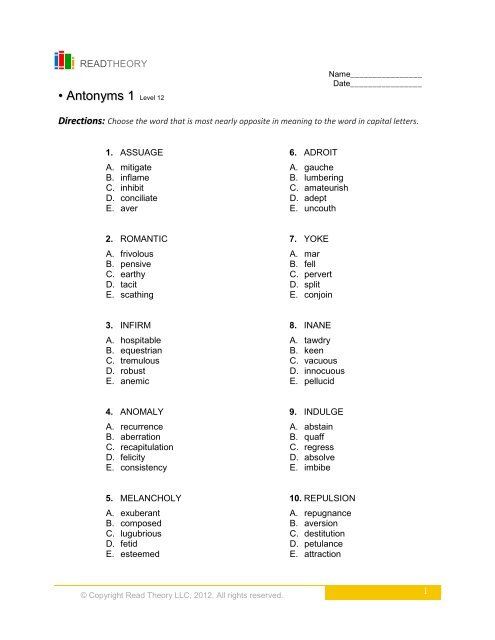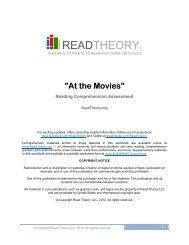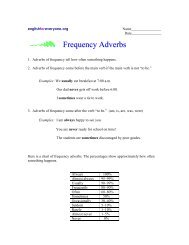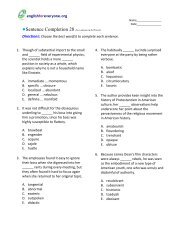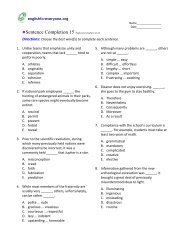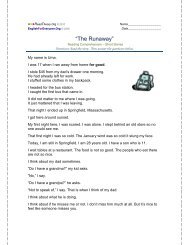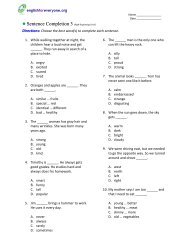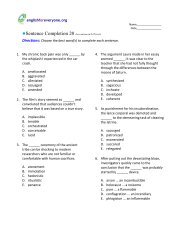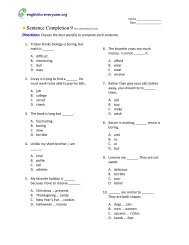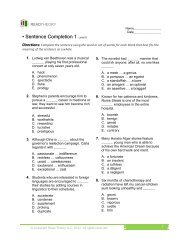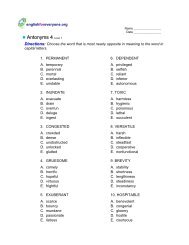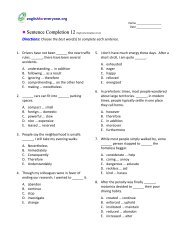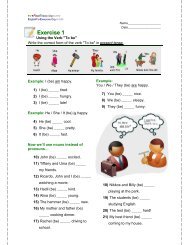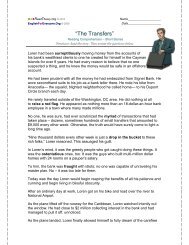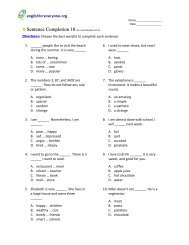• Antonyms 1 - English for Everyone
• Antonyms 1 - English for Everyone
• Antonyms 1 - English for Everyone
Create successful ePaper yourself
Turn your PDF publications into a flip-book with our unique Google optimized e-Paper software.
READTHEORY<br />
<strong>•</strong> <strong>Antonyms</strong> 1 Level 12<br />
© Copyright Read Theory LLC, 2012. All rights reserved.<br />
Name________________<br />
Date________________<br />
Directions: Choose the word that is most nearly opposite in meaning to the word in capital letters.<br />
1. ASSUAGE<br />
A. mitigate<br />
B. inflame<br />
C. inhibit<br />
D. conciliate<br />
E. aver<br />
2. ROMANTIC<br />
A. frivolous<br />
B. pensive<br />
C. earthy<br />
D. tacit<br />
E. scathing<br />
3. INFIRM<br />
A. hospitable<br />
B. equestrian<br />
C. tremulous<br />
D. robust<br />
E. anemic<br />
4. ANOMALY<br />
A. recurrence<br />
B. aberration<br />
C. recapitulation<br />
D. felicity<br />
E. consistency<br />
5. MELANCHOLY<br />
A. exuberant<br />
B. composed<br />
C. lugubrious<br />
D. fetid<br />
E. esteemed<br />
6. ADROIT<br />
A. gauche<br />
B. lumbering<br />
C. amateurish<br />
D. adept<br />
E. uncouth<br />
7. YOKE<br />
A. mar<br />
B. fell<br />
C. pervert<br />
D. split<br />
E. conjoin<br />
8. INANE<br />
A. tawdry<br />
B. keen<br />
C. vacuous<br />
D. innocuous<br />
E. pellucid<br />
9. INDULGE<br />
A. abstain<br />
B. quaff<br />
C. regress<br />
D. absolve<br />
E. imbibe<br />
10. REPULSION<br />
A. repugnance<br />
B. aversion<br />
C. destitution<br />
D. petulance<br />
E. attraction<br />
1
Answers and Explanations<br />
1) B<br />
The word assuage means to ease or make less severe. A massage can assuage pain in one’s muscles. The opposite of<br />
assuage is to worsen or agitate. Because inflame means to make more heated or violent, choice (B) is correct.<br />
(A) is incorrect because mitigate means to soften. This is practically synonymous with assuage, not the opposite of it.<br />
(C) is incorrect because inhibit means to hold back. This is not the opposite of assuage.<br />
(D) is incorrect because conciliate means to placate. This is not the opposite of assuage.<br />
(E) is incorrect because aver means to declare to be true. This is not the opposite of assuage.<br />
2) C<br />
The word romantic means fanciful or unrealistic. For example, most utopian ideas are considered romantic, since they are<br />
idealized and practically impossible to carry out fully. The opposite of romantic is practical or realistic. Because earthy<br />
means realistic or practical, choice (C) is correct.<br />
(A) is incorrect because frivolous means petty or trivial. This is not the opposite of romantic.<br />
(B) is incorrect because pensive means dreamily thoughtful. This is nearly synonymous with romantic, not the opposite of<br />
it.<br />
(D) is incorrect because tacit means silently understood or implied. This is not the opposite of romantic.<br />
(E) is incorrect because scathing means harshly critical. This is not the opposite of romantic.<br />
3) D<br />
The word infirm means feeble or weak in body or health. A very old dog would likely be infirm. The opposite of infirm is<br />
strong in health. Because robust means strong and healthy, choice (D) is correct.<br />
(A) is incorrect because hospitable means receptive or open. This is not the opposite of infirm.<br />
(B) is incorrect because equestrian means mounted on horseback. This is not the opposite of infirm.<br />
(C) is incorrect because tremulous means quivering or fearful. This is not the opposite of infirm.<br />
(E) is incorrect because anemic means listless or weak. This is synonymous with infirm, not the opposite of it.<br />
4) E<br />
The word anomaly means irregularity or deviation from the norm. For example, snow in July would be a weather anomaly<br />
in most parts of the Northern Hemisphere. The opposite of an anomaly is something that happens routinely. Because<br />
consistency is a steadfast adherence to routine or <strong>for</strong>m, choice (E) is correct.<br />
(A) is incorrect because a recurrence is something that has occurred more than once. This is not the opposite of anomaly,<br />
since the fact that something has occurred more than once does not mean it happens routinely.<br />
(B) is incorrect because an aberration is something different from the usual. This is synonymous with anomaly, not the<br />
opposite of it.<br />
(C) is incorrect because a recapitulation is a brief summary that restates the main points of an argument. This is not the<br />
opposite of anomaly.<br />
(D) is incorrect because felicity is feeling great happiness. This is not the opposite of anomaly.<br />
5) A<br />
The word melancholy means sad or depressed. The opposite of depressed is cheery. Because exuberant means happy<br />
or having high spirits, choice (A) is correct.<br />
(B) is incorrect because composed means acting sober or calm. This is not the opposite of melancholy.<br />
(C) is incorrect because lugubrious means sorrowful. This is practically synonymous with melancholy, not the opposite of<br />
it.<br />
(D) is incorrect because fetid means foul-smelling. This is not the opposite of melancholy.<br />
(E) is incorrect because esteemed means highly valued or regarded. This is not the opposite of melancholy.<br />
© Copyright Read Theory LLC, 2012. All rights reserved.<br />
2
6) C<br />
The word adroit means skillful. An expert carpenter would be described as an adroit carpenter. The opposite of adroit is<br />
unskilled or maladroit. Because amateurish means inept or having the faults of a beginner, choice (C) is correct.<br />
(A) is incorrect because gauche means crude or socially awkward. This is not the opposite of adroit.<br />
(B) is incorrect because lumbering means moving clumsily. This is not the opposite of adroit, since it is too limited in<br />
meaning. One can be skillful at tasks that do not require motion.<br />
(D) is incorrect because adept means very skilled. This is synonymous with adroit, not the opposite of it.<br />
(E) is incorrect because uncouth means unmannerly or socially awkward. This is not the opposite of adroit.<br />
7) D<br />
The word yoke means to unite or join together. Two oxen are yoked if they are tied together to pull a wagon. The opposite<br />
of yoke is separate. Because split means to divide or separate, choice (D) is correct.<br />
(A) is incorrect because mar means to damage. This is not the opposite of yoke.<br />
(B) is incorrect because fell means to chop down. This is not the opposite of yoke.<br />
(C) is incorrect because pervert means to misuse. This is not the opposite of yoke.<br />
(E) is incorrect because conjoin means to join together. This is synonymous with yoke, not the opposite of it.<br />
8) B<br />
The word inane means foolish or silly. An idiot might make an inane comment. The opposite of inane is insightful or<br />
intelligent. Because keen means smart or insightful, choice (B) is correct.<br />
(A) is incorrect because tawdry means gaudy or cheap. This is not the opposite of inane.<br />
(C) is incorrect because vacuous means lacking in intelligence. This is synonymous with inane, not the opposite of it.<br />
(D) is incorrect because innocuous means harmless. This is not the opposite of inane.<br />
(E) is incorrect because pellucid means clear in meaning. This is not the opposite of inane, because clarity in meaning<br />
does not necessarily imply intelligence.<br />
9) A<br />
The word indulge means to give in to a craving or desire. To indulge is to willingly give in to a temptation. The opposite of<br />
indulge is to refrain from a desire. Because abstain means to refrain deliberately from something, choice (A) is correct.<br />
(B) is incorrect because quaff means to drink deeply or with pleasure. This is not the opposite of indulge.<br />
(C) is incorrect because regress means to move backward. This is not the opposite of indulge.<br />
(D) is incorrect because absolve means to clear from blame. This is not the opposite of indulge.<br />
(E) is incorrect because imbibe means to consume. This is practically synonymous with indulge, not the opposite of it.<br />
10) E<br />
The word repulsion means the state of wanting to repel or reject something. For example, one might feel repulsion<br />
towards eating insects. The opposite of repulsion is to be drawn to something or to desire something. Because attraction<br />
is the state of drawing one in or being alluring, choice (E) is correct.<br />
(A) is incorrect because repugnance is a strong distaste. This is synonymous with repulsion, not the opposite of it.<br />
(B) is incorrect because aversion is a strong feeling of dislike. This is synonymous with repulsion, not the opposite of it.<br />
(C) is incorrect because destitution is deprivation or poverty. This is not the opposite of repulsion.<br />
(D) is incorrect because petulance is rudeness. This is not the opposite of repulsion.<br />
© Copyright Read Theory LLC, 2012. All rights reserved.<br />
3


